The global automotive industry has taken a turn towards sustainability and eco-friendly solutions, where electric vehicles (EVs) are one of the emerging leaders. According to a recent notification from the Indian government, it has taken necessary steps toward the adoption of electric buses and other EVs by rolling out a range of financial and non-financial incentives, new government schemes, new electric vehicle subsidy models, and policy measures. The blog goes deep into the changing landscape of electric vehicle sales in India, especially when it relates to electric buses and the pricing with the initiatives pushing for adoption.
Table of Contents
Table of Contents
- Growing Electric Vehicles Market in India
- Electric Bus Pricing in India
- Electric Vehicle Subsidy & Government Schemes to Boost Electric Bus Sales in India
- Financial and Non-Financial Incentives for Electric Vehicles in India
- Incentive Schemes for Electric Bus Manufacturers in India
- Role of Electric Vehicle Stocks in India: Impact On Electric Vehicle Subsidy
- Challenges and the Way Forward
- Future of Electric Vehicles in India
- Electric Vehicles and Sustainability
- Cost Analysis: Electric Vehicle Price and Charging Costs
- Plug-in Hybrid Electric Vehicles vs. Pure Electric Buses
- Electric Vehicle Subsidy Policy in India
- Conclusion
- People Also Search
- 1. Busting Myths About E-Buses: Addressing Common Concerns
- 2. Sustainable Travel Choices: How E-Buses Can Contribute to a Greener Future
- 3. Why Go Electric? Unveiling the Advantages of E-Bus Travel
- 4. The ABCs of E-Buses: A Beginner’s Guide to Electric Buses in India
- 5. Sustainable Bus Tour 2024: Exploring Ways to Human Mobility
- 6. Long-term Cost Benefits of Owning Electric Buses in India
- 7. The Electric Bus Price in India: Cost vs. Value of Owning an Electric Bus and Long-Term Benefits
- 8. Optimizing Electric Bus Efficiency in Harsh Colder Climates: Charging Time and Efficient Energy Consumption Tips
- 9. Electric Vehicles In India: Global and National Leadership’s Role in the Sustainable Future
- 10. The Future of Public Transportation: How Electric Buses Are Transforming Cities in India
- 11. World EV Day 2024: Join the ‘EVolution’ with Sustainable EV Solutions
- 12. Electric Vehicles Charging Stations in India: 2030 Projections
- 13. How Zingbus is Revolutionizing Sustainable e-Mobility in India with Electric Buses
Growing Electric Vehicles Market in India
India’s electric vehicle sector is growing at a very rapid pace, this being driven by technology development, government policies, as well as increased environmental awareness in the populace. Over the coming decade, it will see significant growth in electric commercial vehicles, especially buses, in terms of the market for the whole of India. With cost efficiency, reduced pollution, and long-term benefits, electric buses have induced demand in India.
Electric Bus Pricing in India
Pricing stays to be as a critical aspect for the mass adoption of the electric buses in India. The electric bus India prices vary on the basis of technology, seating capacity and brand it belongs too.
A 50-seater electric bus price in India is priced between, 1.5 crores to 2.5 crores.
Small Electric Bus India price or the plug-ins are relatively cheaper, making them suitable for travelling short-distance.
As the initial costs of Electric Buses in India are high, Electric Vehicle subsidy, and incentive schemes are bridging this gap, making them affordable for travellers.
Electric Vehicle Subsidy & Government Schemes to Boost Electric Bus Sales in India
The Indian government has proposed a number of central and state government schemes to promote the use of electric vehicles, especially electric buses. They focus on incentives, tax exemptions, and infrastructural development.
Electric Vehicles Subsidy in India
Electric vehicle subsidies have been one of the key factors driving the growth of electric vehicles in India. EVs, for instance, have gained prominence with the government’s scheme, where ₹10,000 crores have been allocated and Electric Vehicles subsidies of up to ₹55,000 for an electric two-wheeler and ₹20 lakh for an electric bus are available. Other schemes, such as those in Maharashtra and Delhi, offer waivers on road taxes and registration fees besides offering incentives.
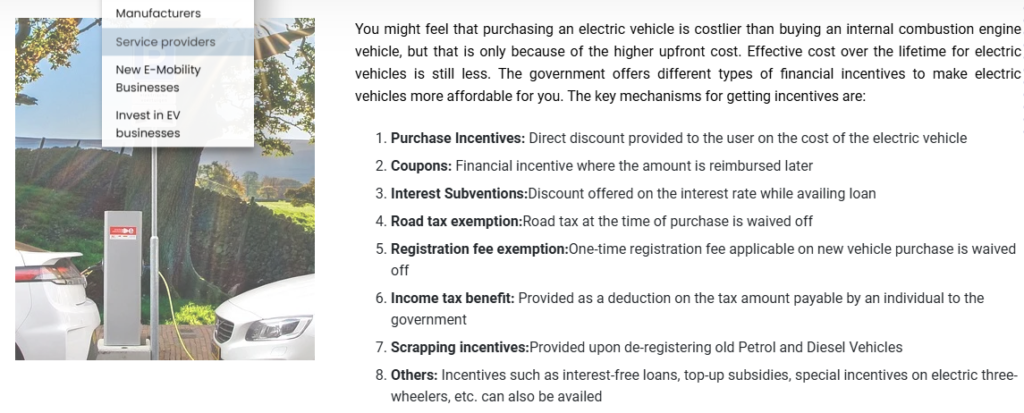

Tax benefits under Section 80EEB for EV loans further reduce ownership costs. These Electric Vehicles subsidies significantly lower the electric vehicle price, making EVs more accessible and encouraging adoption, thereby driving growth in electric vehicle sales in India.
Schemes implemented by the Central Government
Faster Adoption and Manufacturing of Hybrid and Electric Vehicles (FAME) Scheme
In FAME India Phase II, the government set aside ₹10,000 crores for the adoption of EVs, concentrating on electric buses, two-wheelers, and four-wheelers.
Electric Vehicles subsidies of as much as ₹20 lakh per bus are given as incentives to encourage purchases.
National Electric Mobility Mission Plan (NEMMP)
This is targeting 6–7 million hybrid and electric vehicle sales by 2024; more specifically, it is focusing on the commercial part, like electric buses.
Production-Linked Incentive (PLI) Scheme
Incentives have been given to electric vehicle manufacturers in India to increase local production and reduce imports in the country.
Government Solar Panel Scheme
This policy indirectly supports EVs by encouraging the adoption of solar energy that is used at charging stations for electric vehicles and decreases the overall cost of charging.
State-specific policies
Every state has developed their schemes that encourage Electric Vehicles;
Maharashtra Government Schemes
Maharashtra provides high incentives for Indian electric bus manufacturers, along with rewards for its buyers.
Delhi EV Policy
Delhi has a policy of exempting road taxes and registration fees for electric vehicles, which is a direct financial savings. Explore more at Delhi EV Dashboard.
Karnataka Electric Vehicle Policy
Karnataka has provided incentives for EV manufacturing hubs to attract companies that manufacture electric vehicles into making India a hotspot.
Financial and Non-Financial Incentives for Electric Vehicles in India
For making EVs more accessible, the focus of the government of India has rolled out for the mix of financial and non-financial incentives:
Financial Incentives:
- Subsidies: The Electric Vehicle Subsidy is given for the upfront costs for the buyers, for the Electric Buses in India.
- Tax Exemptions as the buyers will be given the benefit from the lower Electric Vehicle Tax exemptions as given.
- Electric Vehicles are attracting a GST at a rate of 5% is comparison to the 28% of the internal combustion on the Engine Vehicles.
- Loans are given by Indian Government for EVs to stay competitive interest rates across.
Non-Financial Incentives:
- Electric Vehicles are given the priority lanes in the urban areas.
- Electric Vehicle are even given reductions on parking fees.
- Electric Vehicle Subsidy is given for the support for Research and Development on Electric Vehicle Technology.
Incentive Schemes for Electric Bus Manufacturers in India
Electric bus manufacturers in India, such as Tata Motors, Ashok Leyland, and BYD, enjoy growth driven by rising demand for electric buses. They leverage the current government incentives to increase production with improved efficiency and lower costs, resulting in competitive pricing.
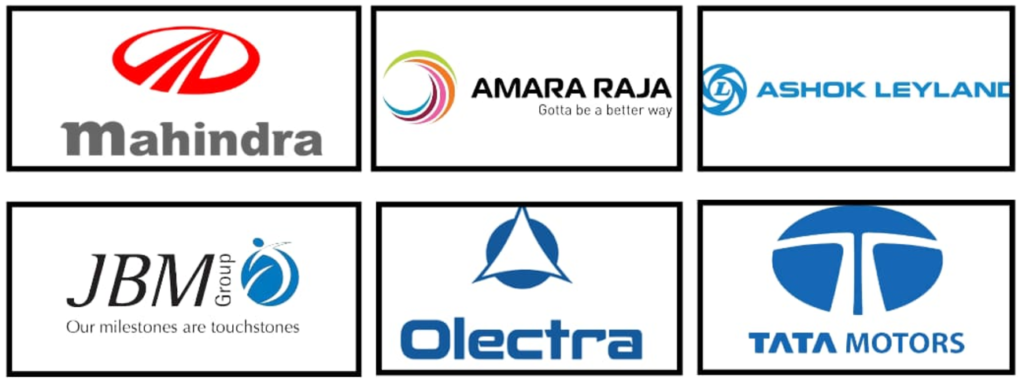
Some significant initiatives to fuel this growth are capital subsidies to set up manufacturing units and subsidies on the upgrading of technology to upgrade the electric vehicle’s advanced battery. These steps would not only strengthen the manufacturing ecosystem but also facilitate the production of efficient, cost-effective electric buses, accelerating India’s transition toward sustainable transportation.
Role of Electric Vehicle Stocks in India: Impact On Electric Vehicle Subsidy
With the constant expansion of EV market in India, the investors interest towards it is also increasing towards the Electric Vehicles companies’ share price. The leading stocks of EV manufacturers and the battery producers which has observed an upward growth. The notable companies include the following as:
- Tata Motors
- Mahindra
- Reliance (Investing in Electric Vehicles Battery), Bajaj Auto, TVS Motors Company, Maruti Suzuki India, and more. See the full list here.
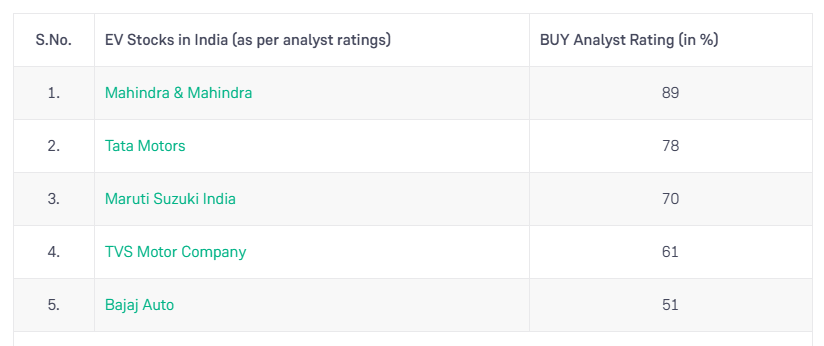
The electric vehicle stocks in India reflect the long-term potential of the electric vehicle market to offer investors and impact electric vehicle subsidy from governments in various ways, creating greater opportunities for raising the green wave in the country.
Challenges and the Way Forward
Despite the aligning progress, the challenges pertain as:
- Higher costs: Even with the Electric Vehicle Subsidy, the higher upfront costs of the EVs, which includes the electric buses, deterring the buyers.
- Lack of chagrining infrastructure makes increased anxiety for the charging.
- Limited availability of the advanced Electric Vehicle Battery technologies adds on the cost.
- The uniformity on the policies across the state needed to be streamlined.
Future of Electric Vehicles in India
EVs in the future hold much promise for India but still face challenges. After all, the government effort made with the allocation of ₹10,000 crores under FAME-II only tries to expand EV adoption, but the infrastructure gap is glaring. India has 6,586 public charging stations as of 2023, of which 1.5 million are on the road. Advances in electric vehicle technology, including fast charging and long-lasting batteries, are ongoing, while the costs remain high, and most batteries are imported from abroad.
Despite these challenges, the Indian EV market is expected to grow at a CAGR of 49% between 2022 and 2030, with sales of EVs expected to touch 17 million units annually by 2030. Collaboration with the private players is, therefore, the way; Tata Power, for instance, has a plan to put up 25,000 charging points by 2025. For EVs, however, to gain mainstream acceptance, India needs to address issues of affordability and infrastructure deficits in tandem with technological advancement.
Electric Vehicles and Sustainability
EV adoption aligns with sustainability in India and a goal toward achieving carbon neutrality. Pure electric vehicles, for example, electric buses, are essential to address urban air pollution and benefit public transport systems. Replacing diesel buses with electric buses would drastically reduce the emission of greenhouse gases and improve air quality in cities.
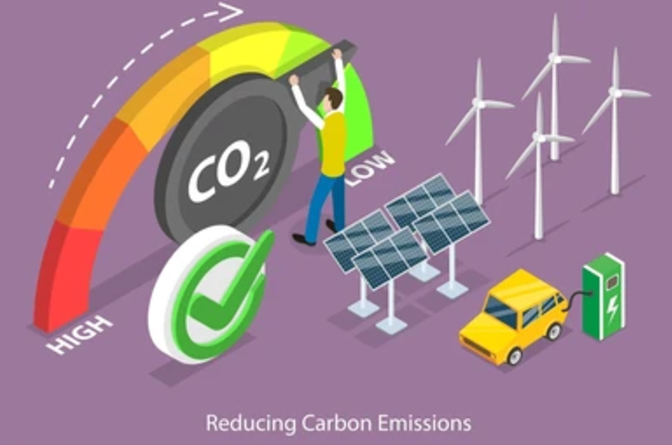
For instance, the lifetime reduction of CO₂ emission due to one electric bus is about 1,000 tons. Due to expanding electric vehicle technology and supportive government policies, EVs are driving India closer to its green mobility targets.
Cost Analysis: Electric Vehicle Price and Charging Costs
While an electric vehicle may cost more at point of purchase, their running costs are much lower. The savings through electric vehicle charging are 70% less than the cost for diesel or petrol and create long-term savings, such as a 50-seater electric bus saving around Rs 10 per kilometre compared to its diesel counterpart, creating substantially lower operating costs for fleets.
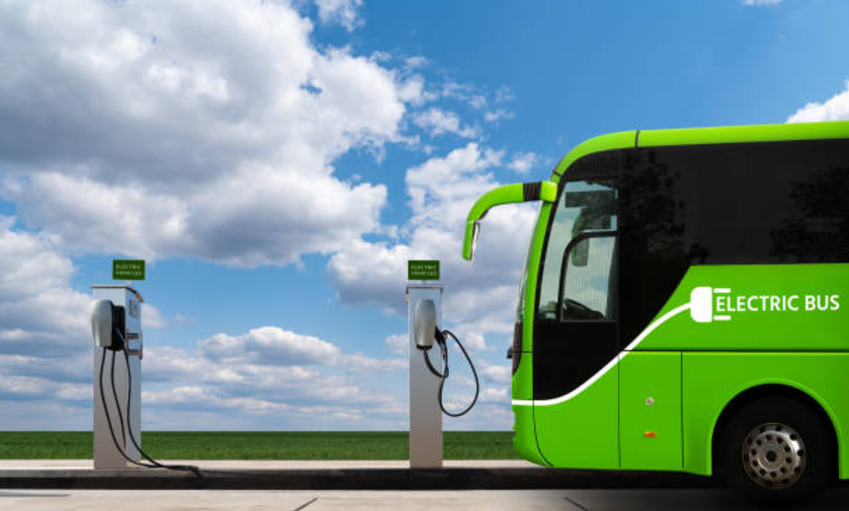
These savings over an automobile’s lifetime offset the premium upfront cost, and that is how EVs benefit from being friendly to the environment and also cheap. Such cost advantages are encouraging more adoption across public and private transportation sectors.
Plug-in Hybrid Electric Vehicles vs. Pure Electric Buses
Plug-in hybrid electric vehicles are on the way, adding to the flexibility of both traditional and electric sources. Of course, pure electric buses have far greater scope, keeping them compatible with the vision of India towards green mobility.
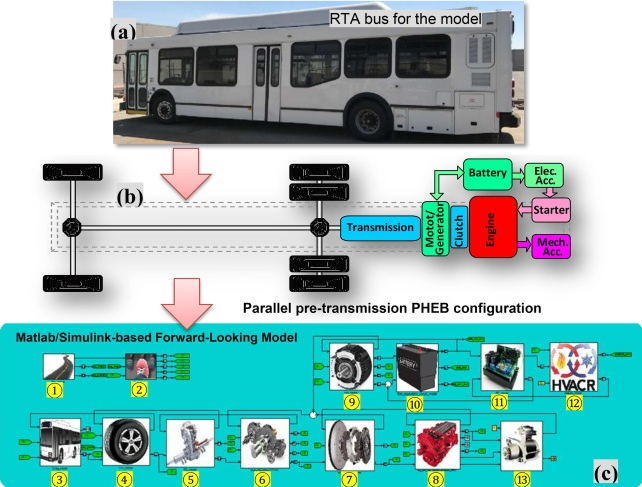
Pure EVs eliminate tailpipe emissions and rely solely on electricity, which is the future towards environmental happiness. Hybrids offer the best of both worlds for the meantime, but pure electric models are the future, in order to deliver on the infrastructure and technology needed for zero-emission public transport.
Top Electric Vehicle Companies in India
India’s EV market is booming and is supported by innovative electric vehicle manufacturers such as:
- Tata Motors: Known for reliable electric buses and diverse commercial EVs.
- Ashok Leyland: The leader in electric commercial vehicles (e-CVs).
- BYD India: Focus on the latest EV technology.
- Olectra Greentech: The Electric Bus Company with a humble beginning dedicated to its drive for sustainable mobility.
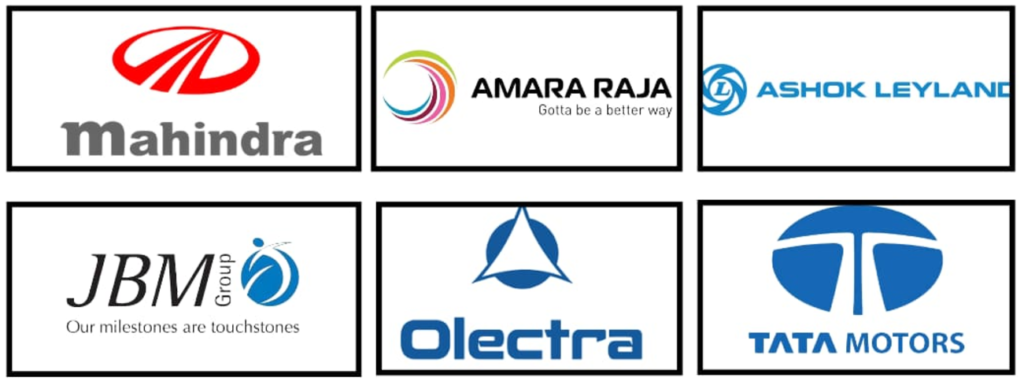
These companies are at the forefront of India’s transition to electric vehicles, guided by legislation and incentives to promote innovation and sustainability.
Electric Vehicle Subsidy Policy in India
India’s electric vehicle subsidy policy encourages cross-sector cooperation in a bid to expand the potential adoption of electric vehicles. The policy requires there be financial and non-financial incentives such as Electric Vehicles subsidies and tax exemptions that can make electric vehicles available to the public. Research and innovation in electric vehicle technology are also encouraged in order to ensure India competes globally in electric vehicle markets. State-specific policies, such as Maharashtra and Delhi, enhance the central government efforts, which target infrastructure development as well as encourage public EV adoption.
Conclusion
India is quite promising in holding up electric buses with integrated government schemes, financial incentives, and infrastructure measures. As the sales of electric vehicles continue to rise in India and electric vehicle technology continues to evolve, the country will be in front of a global market for electric vehicles. Further acceleration of this transition will be accelerated with lower electric vehicle prices and more infrastructure. By championing electric buses and sustainable mobility, India is designing a greener and more prosperous future in transportation, and zingbus is working in these footsteps.





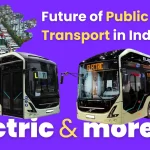
Leave a Reply